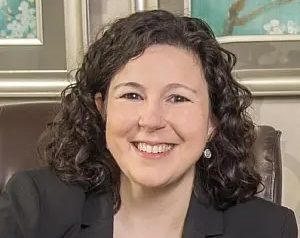
With the one-year anniversary of the October 7 attacks just passed and the war between Israel and Hamas ongoing, many still aren’t sure what to say about the situation or how to approach the topic. On Monday, September 30, Ursinus welcomed Samantha Harris, an attorney specializing in free speech for students and faculty, for her lecture titled “Antisemitism, Anti-Zionism, and Freedom of Speech: Navigating the Post-10/7 Landscape” in Musser Auditorium, Pfahler Hall. This was the 14th lecture in the “Jewish Life Series,” which began in 2015. Harris was introduced by Professor Jonathan Marks from the Politics Department. After the introduction, both sat at a table at the front, and Professor Marks began by asking Harris questions about her professional analysis of recent free speech cases, mainly involving social media posts. The word Harris emphasized at the start of the lecture and throughout was “nuance.” Each case, she noted, would not be cut-and-dry, and would involve multiple factors to consider.
The opening case discussed was that of Maura Finkelstein, a professor at Muhlenberg College, who expressed anti-Zionist sentiments. After several students objected, Finkelstein was ultimately dismissed from her position at the college. Harris, having reviewed the case, stated that she believes such firings are unconstitutional based on First Amendment principles, and that expressing opinions on matters of public concern is not grounds for disciplinary action. However, she did highlight that the situation would be different if the professor had explicitly associated her views with the college, which could imply that the institution shared her stance. Another justification could be if Finkelstein’s opinion hindered her ability to teach impartially. Yet, determining whether someone is teaching fairly is often difficult.
Another case examined was a Title VI complaint from Columbia University, where some students felt there wasn’t adequate protection for Jewish students. All universities that receive federal funding are bound by Title VI anti-discrimination laws under the Civil Rights Act of 1964, which applies to Columbia. However, the lecture raised the question: how can universities enforce Title VI without infringing on the First Amendment?
During the Q&A session, an audience member asked, “Can it help if free speech is driven underground?” Harris responded, “Movements were made because people could talk about them,” emphasizing that the more people are forced to tolerate hate speech, the stronger the case for change. She added, “People must have these dialogues, even if it makes them fearful,” and noted that “discomfort is a part of life.” Harris said that speech crosses a line, however, when it becomes threatening. This raises the question: when does speech become threatening? Is it when a direct threat of harm is made?
The conversation also touched on the current political climate in the United States, and a fear of expressing controversial opinions. The lecture concluded with a call from Harris for more open dialogue, not just in the U.S. but globally, to begin addressing these tensions. A small group of students had the chance to engage in such a dialogue with Harris during a one-hour meeting beforehand.
Aidan Nadell ‘25 remarked, “I was very encouraged that we were able to get so many different people’s perspectives in the same room. We had both the president of UC Democrats and UC Republicans in the same circle, able to see eye to eye… I wish more people on this campus, and in general, were having these types of conversations. I realize it’s not always possible to get into a formal discussion group like this, but we as a society/country have generally forgotten how much more we have in common than our differences. I certainly learned a lot about free speech that I wouldn’t otherwise have known… Politics is definitely not my realm of expertise. There wasn’t one moment that stood out in particular, although I left feeling very impressed and grateful for Sam Harris coming to speak.”
The overall impression from students, faculty, and other attendees seemed to be that Harris’s visit sparked many questions and intriguing conversations that extended beyond the room and into the following days.
